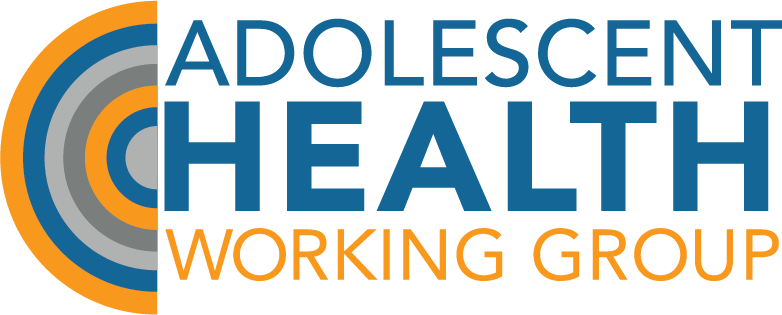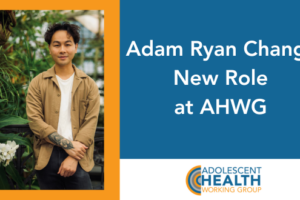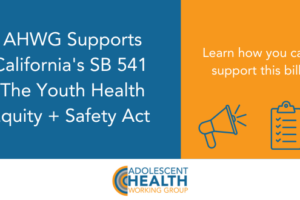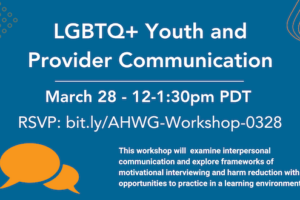
AHWG Sexual Health Toolkit: When Sexual Health Comes Under Attack
In 2016, the California Healthy Youth Act went into effect requiring California public schools (charter and non-charter) to provide comprehensive sexual health education at least once in middle school and at least once in high school. The American Civil Liberties Union provides a great handout for more context. Opposition has grown in 2019 as the California Board of Education recently adopted a new framework for implementation. See a full article here.
The Adolescent Health Working Group has been thrown into the spotlight as pages from our Adolescent Provider Toolkit on Sexual Health have been taken out of context and widely shared by conservative groups. You can click here for a full version of our Sexual Health Toolkit. We recognize that many of our partners and allies have questions and we will do our best to answer them here. As other states follow California (see an article here about Colorado), we intend to provide accurate information so that our allies can continue to push forward advancements in sexual health education in their respective states.
1. AHWG has been an advocate of adolescent health for over two decades. Our advocacy has broached topics and policies related to minor consent and confidentiality, substance use and harm reduction strategies, guiding providers and parents/caregivers to better understand mental health topics, and promoting health care practices that are inclusive of LGBT youth.
2. AHWG has worked with a broad range of providers, parents/caregivers, and youth to create evidence-based toolkits to increase the capacity of adolescent health providers. In 2010 (an update to our 2003 version), we published our Sexual Health Toolkit as a part of our Adolescent Provider Toolkit series. Our website specifically mentions, “Note that our resources for providers are not meant for direct youth consumption. However, these do contain resources for providers to facilitate conversations with youth and their parents/caregivers.”
3. The circulating images and pages from our 2010 Sexual Health Toolkit focus on two specific handouts, “Be Safe with Sex Toys,” and “Wetter Makes it Better.” As noted in our toolkit, this toolkit was published for a national audience. That being said, providers ultimately decide with their patient/client to determine what information is relevant or appropriate. AHWG works with providers who provide services for youth ages 11 to 24. Therefore, a lot of the content is suitable for providers to hold conversations with their patients/clients who range from middle-school to “transitional-age youth” or youth ages 18 to 24.


4. Variations of these handouts are now circulating on social media. Many of these versions have been cropped or altered with additional imagery, and as oppositionists add their own language or explanation to the graphics, little to no context is given about the intended use of the resource.

5. The handouts immediately preceding the resources in question include “Sex, Virginity, & Abstinence,” “Having Sex on your Own Terms,” “Healthy Relationships,” and “Love Shouldn’t Hurt.” Providers are reminded to use these hands “as a guide for counseling your teen patients.” We invite everyone to review the full 70+ page toolkit to have a better understanding of the topics covered. We created and continue to updated all of these resources because research shows that a more informed youth leads to a healthier and happier adult. Our intent is to be as comprehensive as possible while also ensuring that we do not shame youth who are exploring their natural sexuality at age-appropriate levels.
When confronted with fear and ignorance, we must all do our part to remain vigilant with truth and facts. The present political climate would have us accept half-truths as facts, and this is where confusion spreads and leaves vulnerable communities behind. Our resources remain medically and community-informed. We hope that this blog post provides clarity and context. We value the relationships we have cultivated with our educators, primary care providers, therapists, social workers, counselors and other allies. We are nearly wrapped up with another update to our Sexual Health Toolkit and are prepared to publish in late 2019/early 2020. We are thankful to all of our partners and collaborators, including the San Francisco Department of Public Health, UCSF, and Planned Parenthood.



